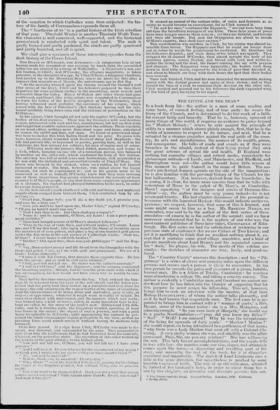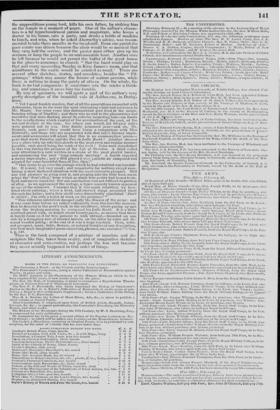THE LIVING AND THE DEAD
Is a book from life : the author is a man of some reading and some taste, of earnest feeling, and of true piety : he wears the livery of the Church, and is determined to do the:work of a faith- ful servant fairly and honestly. That he is, however, ignorant of many things of this world, it requires no evidence to prove beyond his " Modern Moloch ; "• where he rails against the principle of utility in a manner which shows plainly enough, first, that he is the victim of ignorance in respect to its nature, and next, that he is actuated by a strange prejudice against the real pride of the coun- try, its arts and manufactures, the sources of its wealth, power, and consequence. He talks of roads and canals as if they were breaches in the citadel, instead of their being (what they are) the great arteries of actual life and health. If England were nothing but romantic villages and retired nooks, remarkable for picturesque solitude—if Leeds, and Manchester, and Sheffield, and Birmingham were not—the author would have little reason at this moment to pride himself in the name of Briton. The au- thor's intellectual domain spreads on the side of the imagination: he is also familiar with the personal history of the Church for the last half-century. Not, however, derived from his knowledge ; he is young, it is clear, for many more reasons than that he talks with veneration of RosE in the pulpit of St. Mary's, at Cambridge. ROSE! squeaking " of the dangers and errors of German libe- ralism"—ay, the author must be very young indeed—he is not seven-and-twenty. His last chapter discourses of his personal in- tercourse with the lamented HEBER: this would indicate earlier ex- perience ; we suspect, however, that some of this is feigned, and some might occur to him as a boy. Mn ERSKINE NEELE, we remember, was said to be the author of the first series of these
anecdotes—of course he is the author of the second; and we have moreover understood that he is the nephew of one who was the most eminent publisher of these later times, CONSTABLE of Edin- burgh. His first series we had the satisfaction of reviewing in our previous state of existence+ (for we are Critics of Two Lives); and yet it is mortifying to think that we recollect nothing about it, ex- cept that it contains some good village anecdotes, and a kind of private manifesto about Lord BYRON and his separated spouse— his " duck," his plague, his wife. The merits of this volume are similar : the sketches of character are true, lively, and good-na- tured.
The " Country Curate" answers this description ; and his " Pil- grimage" is a series of clever and amusing notes upon the different persons and scenes such a person is likely to encounter. In his own person he records the pains and pleasures of a pious, humble, learned man. He is a fellow of Trinity, Cambridge : he resolves upon abandoning a college life, and taking a country curacy. The author is evidently a Cambridge man, and therefore we cannot un- derstand how he has fallen into the blunder of supposing that for
this purpose he must resign his fellowship. This act, however,
hrings him to seek an interview with the master, at that time Bishop HINCHCLIFFE ; of whom the author talks pleasantly, and as if he had known that respectable man. The first cure he is ap- pointed to brings him in contact with a " woman of parts," a Mrs. Dysart, sister of the former rector : she is a Mrs. Malaprop, and amusing enough. " So you were born at Morpeth," she would say to a gawky Northumbrian ;—" pray did you know my father ?" " No!" " Well! I am amazed ! Why he was the invambrance of the living for upwards of forty years." " Marlow ! Marlow !" she would repeat, on being introduced to a gentleman of that name, " why there was a Lady Marlow that went off with a Colonel Cla- vering. A very pretty woman she was, and mightily was the affair canvassed. Pray, Sir, are you any relation?" She was addressing the son. This lady has an accomplished niece, and the eurate falls in love with her: she marries some one else, elopes, and ultimately comes upon the town,—a disgusting and revolting part of the story, and unworthy the rest of the book, for it is altogether unnatural and improbable. The sketch of Lord Llanherris en-s a little in the same direction, but nevertheless is marked by some horrible touches of truth. The wife of an old nobleman, actuated by hatred of her husband's heirs, in order to cheat. them has a. son by her chaplain, an irregular and dissolute person : this son,
*The Living and the Death, Second Series. London, 1629. Colburn. t In the &las. the supposititious young lord, kills his own father, by striking him on the temple in a moment of anger. One of the author's charac- ters is a fat hypochondriacal parson and magistrate, who keeps a doctor in his house, eats a pasty, and drinks a bottle of madeira to lunch, and who, when he asked Abernethy's advice, was recom- mended to take three months in the tread-mill. From one parish the poor curate was driven because the choir would be so musical that they sang half the service, and the pastor must either give up his sermon, or keep the people to an unreasonable hour. Another cure he left because he would not permit the butler of the great house in the place to announce in church " that the band would play on that and every succeeding Sunday in King James's room, and that admittance to the castle would be granted as usual." There are several other sketches, stories, and anecdotes, besides the " Pil- grimage," which may amuse the leisure of serious persons, while there is nothing to damp the gaiety of others. On the whole, the book is no bad companion: it sometimes sets the reader a think- ing-, and sometimes it saves him the trouble.
By way of specimen, we will quote a part of the author's very pretty description of the beautiful vale of Ashbourne, in Derby- shire.
" Yet I must frankly confess, that of all the associations connected with Ashbourne, those to me were the most interesting which had reference to Mr. Moore. For some years this distinguished poet lived at the neigh- bouring village of Mayfield ; and there was no end to the pleasantries and anecdotes that were floating about its coteries tespecting him—no limits to the recollections which existed of the peculiarities of the poet, of the wit and drollery of the man. Go where you would, his literary relics were pointed out to you. One family possessed pensand oh, 1\1r. Bramah, such pens ! they would have borne a comparison with Miss Mitford's ; and those who are acquainted with that lady's literary imple- ments and accessories will admit that this is no commonplace praise— pens that wrote Paradise and the Peri in Latta Rookh ! Another showed you a glove torn up into thin shreds in the most even and regular manner possible, each shred being the work of the teeth ! Pairs were demolished in this way during the progress of the Life of Sheridan. A third called your attention to a note written in a strain of the most playful banter, and announcing the next tragi-comedy meeting' A fourth repeated a merry impromptu ; and a fifth played a very 'pathetic air composed and adapted for some beautiful lines of Mrs. Opie." " Our desire to go over the cottage which he had inhabited was irresisti- ble. It is neat, but very small ; and remarkable for nothing except com- bining a roost sheltered situation with the most extensive prospect. Still one had pleasure in going over it, and peeping into the little back-room yclept the ' Poet's Den,' from which so much true poetry had issued to de- light and amuse mankind. But oar satisfaction was not without its portion of alloy. As we approached the cottage, a figure scarcely human appeared at one of the windows. Unaware that it was again inhabited, we hesi- tated about entering ; when a livid, half-starved visage presented itself through the lattice, and a thin shrill voice discordantly ejaculated 'Don't Le afeard ; I'm only a tailor at work on the premises.' "
"'This villanous salutation damped sadly the illusion of the scene : and
it was sonic time before we rallied sufficiently from this horrible desecra- tion to descend to the poet's walk in the shrubbery, where pacing up and down the livelong morning he composed his Ltilla Rookh. It is a little confined gravel walk, in length about twenty paces ; so narrow that there is barely room on it for two persons to walk abreast,—bounded on one side by a straggling row of stunted laurels, on the other by some old de- cayed wooden paling : at the end of it was a huge haystack. Here, with- out prospect, space, fields, flowers, or natural beauties of any description, was that most imaginative poem conceived, planned, and executed."—Vol. i. p. 2-18. Thus is the book composed of a mixture of anecdote and de- scription like this, taken from reality, and of imaginative sketches of character and conversation, not perhaps the less real because they never actually happened in that order of things.



















 Previous page
Previous page